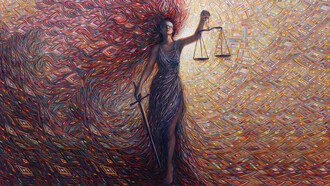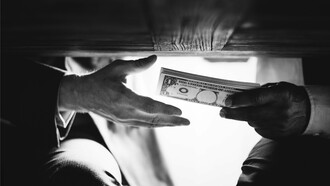There is a widespread belief that terrorism is a political movement with ideological and religious underpinning, whereas drug trafficking is a criminal organization that only seeks to make money. We tend to believe that a terrorist organization aims to destroy the state whereas drug trafficking tends only to undermine it. However, in the long run, drug trafficking will have the same outcome.
Little by little, in Latin America, governments will slowly cease to control their country: thousands of people now live under narco rule. In some communities, you have even to pay to use the town´s bridges. In others, security is provided— and charged for— by criminal gangs. Soon, banks will use gangs to collect their credit card debts and to evict owners from their foreclosed homes. Mobile phone companies will eventually hire them to sell their phone cards. If we continue this way, we will have small independent republics, which will gradually develop their own language, culture, and idiosyncrasies. In a not too distant future, there will be "liberated" zones in each country. Small republics like Isis will sprout like fungi here and there. Our beloved presidents will end up ruling like Assad in Syria and possibly appointing their friends as ambassadors to our marginal areas and making free trade deals with them.
What we thought was another thing differentiating narco states and delinquency from terrorism was ideology. We believed that the former did not care about social development, but this is not so. The narcos with other criminals have become the social providers and lenders of the popular classes. To the extent that loans in the official financial system are restricted to the wealthy, these criminals supply large sectors of the population with easy credit. Narcos don´t care either about paper work or credit ratings: you get the money right away and if you don´t pay your installments on time, you simply vanish from the Earth. When it comes to providing social assistance, they surpass Mother Teresa. It is no surprise to visit favelas in Brazil or Central American slums and see large flat-screen TVs and smart electric washing machines in people´s homes, not to mention the latest-model cars double-parked in the street. No one knows how anyone, in the continent of Macondo, can have so much purchasing power on a budget of $40 a month.
Currently, the narcos and criminals have become just like the radical seem likely to become soldiers of Christ just like radical Islamists who follow Allah. Sometimes, for example, the cartels are described as "pseudo-religious cults" because they seek to justify the torture and murder of their rivals as "Divine Justice." The religious leader of “The Family”, for example, attracted new members of the gang through a religious organization called New Jerusalem. The group has its own "Bible" or spiritual manual. Indoctrination into the larger cartels consists of Bible readings and spiritual courses that are considered important for their members’ personal growth. New recruits are asked to avoid drugs and alcohol, and to keep the "family” united. They also oppose abortion and even in vitro fertilization because it goes against the Scriptures. When they kill, kidnap or cut someone into pieces, they are encouraged to pray for the souls of their victims, who were guilty of failing to live according to divine commands.
Just as the "Cosa Nostra" (Sicilian Mafia) shows its faith by erecting chapels to Father Pio, drug cartels worship such figures as Jesus Malverde, an supposed saint who in life robbed the rich to give to the poor and is known as "The Saint of the Narcos". Supposedly, in the 1970s, Captain Julio Escalante ordered his son Raymundo to be killed for double-crossing him in business affairs. He was said to have been shot and thrown into the sea, but Raymundo begged Malverde for help and his son was then saved by a fisherman. From that moment on, famous drug traffickers like Rafael Caro Quintero, Ernesto Fonseca, Edgar Tellez, César Ortiz, and Amado Carrillo Fuentes began to attend the Church of Malverde. Petitions in this chapel are processed more effectively than in the Catholic Church. One prays for a rival to disappear and Malverde responds without paperwork or any unreasonable demands.
The basis of their doctrine was disseminated by the Christian American author John Eldredge, especially in his book entitled Savage Heart. The author calls on men to face life squarely and give space to their adventurous side. Selling drugs is thus an act of bravery, love, and rebellion similar to zip-lining or white-water rafting. Another church is that of Holy Death, which personifies Death as an object of worship. Represented by a skull dressed as a woman, according to experts she has about ten thousand altars in Mexico alone and welcomes requests for love, affection, good fortune, money, and protection, as well as accepting malicious requests for the punishment of third parties. She is much loved by sex workers demanding revenge on tourists who renege on their promises to marry them and fulfil their well-deserved American dream.
Some say that the rising crime rate in the region is increasingly a result of people’s losing faith in religion. Dostoevsky argued that when the people cease to fear God, they commit atrocities. However, we can argue that the opposite is the case: committing atrocities is more easily done in God’s name.















